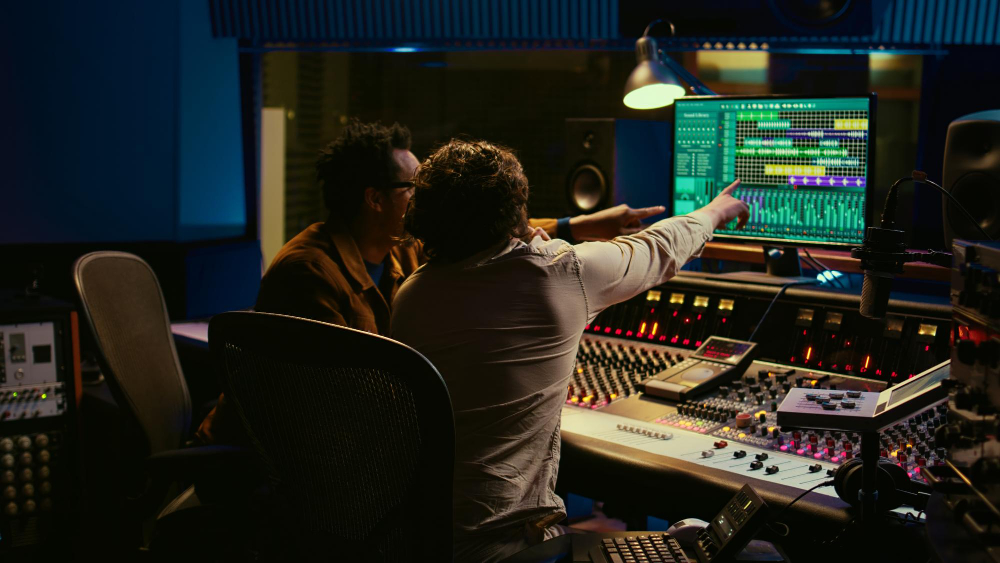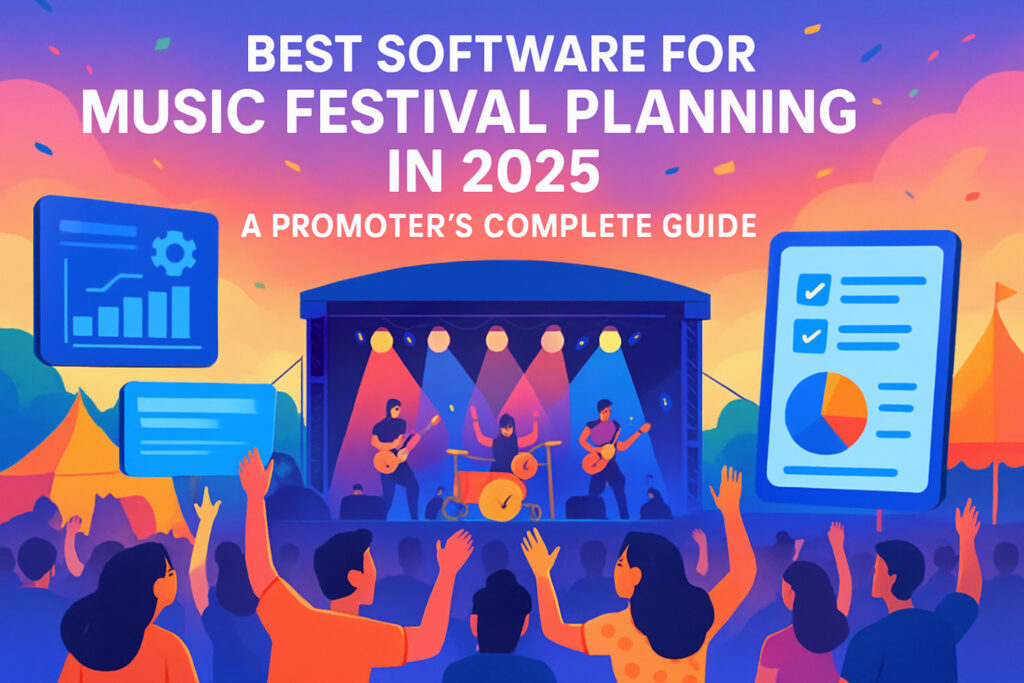
Best Software for Music Festival Planning in 2025: A Promoter’s Complete Guide
The music festival industry is experiencing unprecedented growth, with the global live music market projected to reach $79.7 billion by 2030, growing at a substantial annual rate. This surge brings both opportunity and complexity for festival promoters who must navigate everything from artist bookings to vendor coordination while maintaining razor-thin profit margins.
The music festival market is projected to grow at a CAGR of 24% from 2024 to 2031, driven by immersive experiences and diverse lineups. However, this growth comes with significant challenges that can make or break a festival’s success.
Modern festival promoters face a perfect storm of operational complexity. When you’re talking about organizing a music festival hosting dozens of bands and thousands of guests, often across multiple days or weekends, things can quickly get complicated, even chaotic. The right music festival management software can transform these challenges into streamlined operations.
The Current Reality for Festival Promoters
Today’s festival landscape presents unique operational hurdles that didn’t exist a decade ago. Festival organisers face a dynamic landscape in 2024, with both challenges and opportunities shaping the industry. The industry is dealing with several critical pain points that effective software solutions must address.
Festival promoters are grappling with increased production standards while managing shorter setup times and heightened audience expectations. One of the primary pain points for festival organizers is managing finances effectively. Organizing a festival involves numerous expenses, including talent booking fees, venue costs, production equipment, marketing campaigns, and staff coordination.
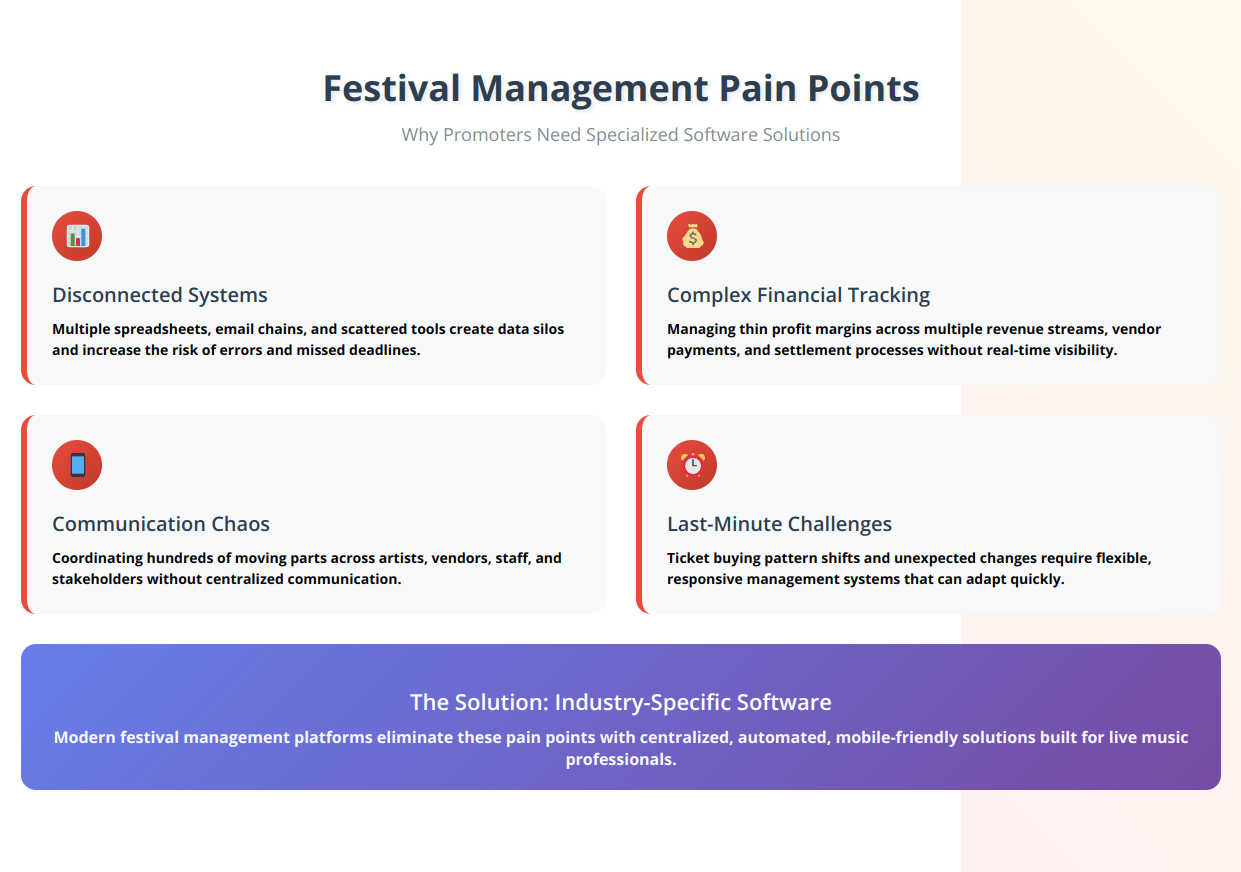
The financial complexity extends beyond just booking costs. Promoters must coordinate vendor payments, track multiple revenue streams, manage staff salaries, and maintain real-time visibility into cash flow. Without proper software support, these financial management tasks can quickly overwhelm even experienced teams.
Another significant challenge is the shift in consumer behavior. As noted in the same industry analysis, music festival ticket sales are shifting to last minute buying patterns, causing liquidity issues for festival promoters. This trend makes financial planning more difficult and increases the need for flexible, responsive management systems.
Communication coordination represents another major operational hurdle. Ask any talent buyer or venue manager, and they will tell you one of their biggest challenges is staying organized. There are hundreds of moving parts, particularly with music festivals, and trying to keep on top of everything is a full-time job.
Essential Features Every Festival Management Platform Must Have
When evaluating music festival management software, promoters need to focus on capabilities that address industry-specific challenges rather than generic event management features. The most effective platforms integrate multiple operational areas into cohesive workflows.
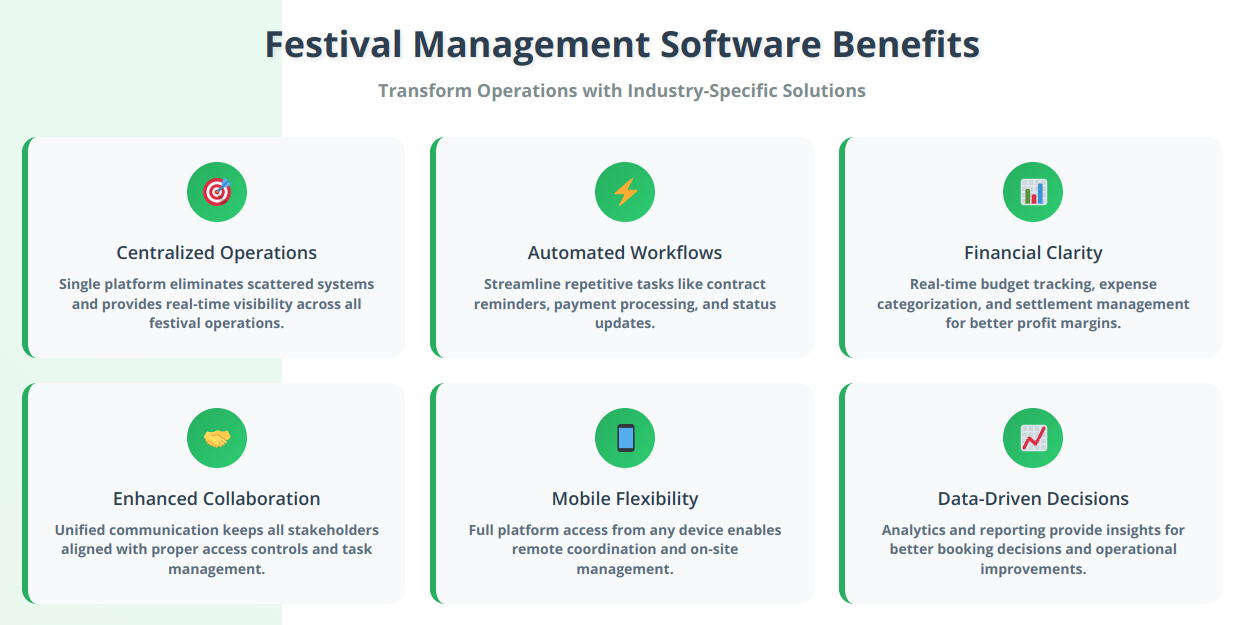
Comprehensive Financial Tracking and Budgeting
Financial oversight capabilities should extend far beyond basic accounting. Software with financial tracking tools simplifies the complex task of managing a festival’s finances. It can handle everything from ticket sales and vendor payments to staff salaries and music festival marketing. Real-time financial visibility helps promoters make informed decisions throughout the planning process.
Modern platforms should provide detailed expense categorization, automated invoice processing, and integrated reporting that gives promoters immediate insight into their financial position. This becomes particularly crucial when dealing with the multiple revenue streams and complex cost structures typical of music festivals.
Centralized Communication and Collaboration Tools
Communication is the glue that holds everything together in festival planning. It’s the lifeline connecting all the moving parts, ensuring everyone is on the same page and working towards a common goal. Effective software platforms eliminate the communication fragmentation that often leads to missed deadlines and coordination failures.
The best systems provide unified communication channels where all stakeholders can access relevant information, track project status, and coordinate tasks without relying on external email chains or messaging apps. This centralization becomes essential when managing the diverse teams involved in festival production.
Artist and Vendor Management Capabilities
Festival promoters need robust tools for managing artist contracts, rider requirements, and technical specifications. The software should handle everything from initial booking negotiations through final settlement processes. This includes contract storage, timeline management, and automated reminders for key milestones.
Vendor coordination features should encompass everything from food service providers to security companies, with integrated approval workflows and communication channels that keep all parties aligned on requirements and timelines.
Integrated Marketing and Promotion Tools
Marketing capabilities should extend beyond basic social media scheduling. Effective platforms integrate with ticketing systems to provide real-time sales data that can inform marketing strategy adjustments. This integration helps promoters optimize their marketing spend based on actual performance metrics.
Mobile Accessibility and Real-Time Updates
Festival management doesn’t happen from a desk. Teams need full platform functionality from mobile devices, whether they’re on-site during setup or traveling between venues. Real-time synchronization ensures that updates made in the field are immediately available to all team members.
Platform Comparison: Choosing the Right Festival Management Solution
Understanding the landscape of available platforms helps festival promoters make informed decisions about which software will best support their unique operational needs. The market offers several distinct categories of solutions, each with its own unique strengths, depending on your festival’s size, complexity, and industry focus.
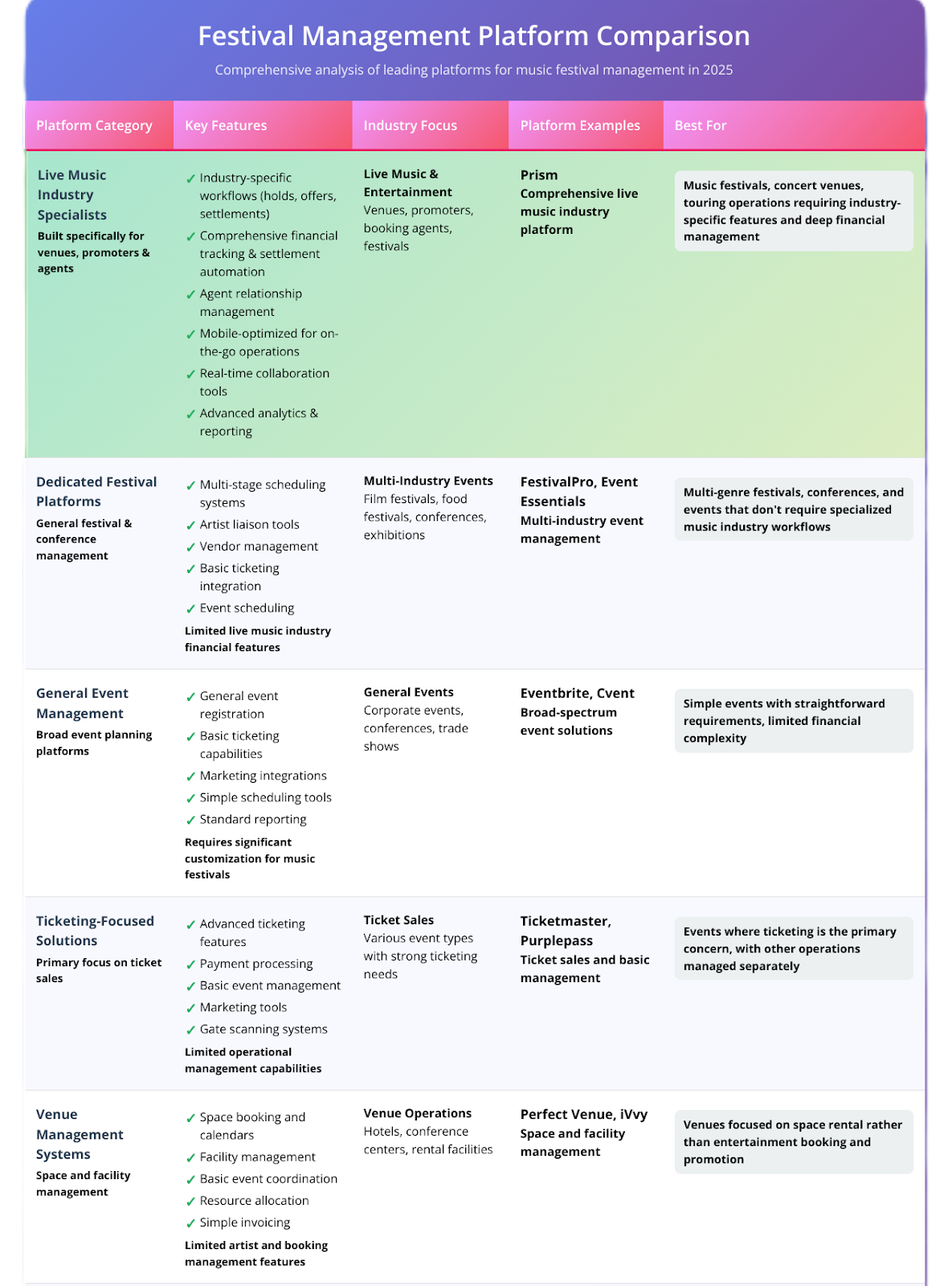
The comparison reveals significant differences in how various platform categories approach festival management challenges. While general event management platforms may offer broader feature sets, they often require extensive customization to handle the complex financial relationships and industry-specific workflows common in music festivals.
Industry-Specific Advantages
Platforms designed specifically for the live music industry offer distinct advantages for festival organizers. These systems understand the unique terminology and processes that define how the industry operates, from initial artist outreach through final settlement procedures.
The comparison also highlights the critical importance of understanding settlement processes and financial management, particularly for festivals dealing with complex revenue sharing agreements between multiple stakeholders. These specialized financial workflows are often poorly supported by general event management platforms.
Platform Selection Strategy
Rather than focusing solely on cost considerations, successful festival promoters evaluate platforms based on their ability to handle industry-specific requirements. The most effective solutions provide comprehensive workflows that eliminate the need for multiple disconnected systems while maintaining the flexibility to scale as festivals grow.
Scaling and Growth Considerations
When evaluating platforms, consider how each option supports festival growth over time. Industry-specific platforms typically offer better scalability for festivals planning to expand their operations, add new stages, or develop multi-day formats that require sophisticated coordination capabilities.
Research indicates that music festivals typically take three to five years to become financially successful, making long-term platform support and feature development crucial for sustained operations. Platforms that understand this growth trajectory can provide better guidance and tools for managing the evolution from startup festival to established annual event.
Integration and Workflow Efficiency
The most effective festival management platforms eliminate the need for multiple disconnected systems by providing comprehensive workflows that connect every aspect of festival operations. This integration becomes particularly valuable for complex financial tracking requirements where festivals need to monitor multiple revenue streams and maintain real-time visibility into their financial position.
Platforms designed specifically for live music operations understand the unique timing and coordination requirements involved in festival production, from initial booking through final settlement procedures. This specialized knowledge translates into features and workflows that can significantly reduce administrative burden while improving operational accuracy.
Software Categories for Festival Management
When evaluating music festival management software options, promoters should focus on platforms that understand the unique demands of the live music industry. Here’s an analysis of the main categories of solutions available in 2025:
Dedicated Festival Management Platforms
Several platforms have emerged specifically for festival and live event management. These solutions typically offer comprehensive feature sets designed around the festival planning workflow, from initial artist outreach through post-event settlement.
These specialized platforms focus specifically on festival and conference management, offering features like artist liaison tools, scheduling systems, and settlement capabilities. The platforms emphasize the unique needs of festival organizers with features designed around multi-day, multi-stage events.
Many provide comprehensive event management with particular strength in scheduling and artist management. These platforms offer real-time updates and reporting tools designed for festival environments.
Live Music Industry Specialists
Some platforms focus specifically on the broader live music industry, providing festival management capabilities within comprehensive venue and promotion management systems. These solutions often provide deeper integration with industry-specific processes like agent relationships and settlement procedures.
These platforms understand concepts like holds, offers, and settlements that are unique to the live music industry. They’re built by teams with industry experience and designed around actual workflow patterns used by successful promoters and venue operators.
General Event Management Platforms with Festival Capabilities
Larger event management platforms offer festival management features within broader event management suites. While these platforms may lack some industry-specific features, they often provide strong integration with marketing and ticketing systems.
However, these general platforms often require significant customization to handle the unique requirements of music festival management, particularly around financial settlements and artist management workflows.
Key Evaluation Criteria
When comparing platforms, promoters should prioritize solutions that offer industry-specific features rather than generic event management capabilities. The software should understand concepts like holds, offers, settlements, and the complex financial relationships typical in live music.
Integration capabilities become crucial for festivals that need to connect with external ticketing platforms, accounting systems, or marketing tools. The best platforms offer API access or pre-built integrations that eliminate manual data entry.
Scalability represents another critical factor. Successful festivals grow, and the management platform should accommodate increased complexity without requiring complete system changes.
Addressing Industry-Specific Challenges
Music festival management involves unique operational requirements that generic event software often can’t handle effectively. Understanding these specific needs helps promoters evaluate which platforms will truly support their operations.
Complex Settlement Processes
Festival finances involve multiple parties, revenue-sharing agreements, and detailed settlement procedures that extend well beyond simple vendor payments. As previously noted in the industry research, music festivals may be very attractive and, to the inexperienced eye, they could make millions. But when you dig a little deeper, you can prove margins are pretty thin, even with record-high ticket prices.
Effective software must handle these complex financial relationships while providing transparency for all stakeholders. This includes managing co-promoter arrangements, artist guarantee structures, and percentage-based revenue sharing agreements.
Multi-Venue and Multi-Day Coordination
Large festivals often involve multiple stages, venues, or even different geographic locations. Management software must provide clear visibility across all these operational areas while maintaining detailed tracking for each individual component.
The platform should handle scheduling conflicts across venues, coordinate shared resources like security or medical staff, and provide consolidated reporting that gives organizers a complete operational picture.
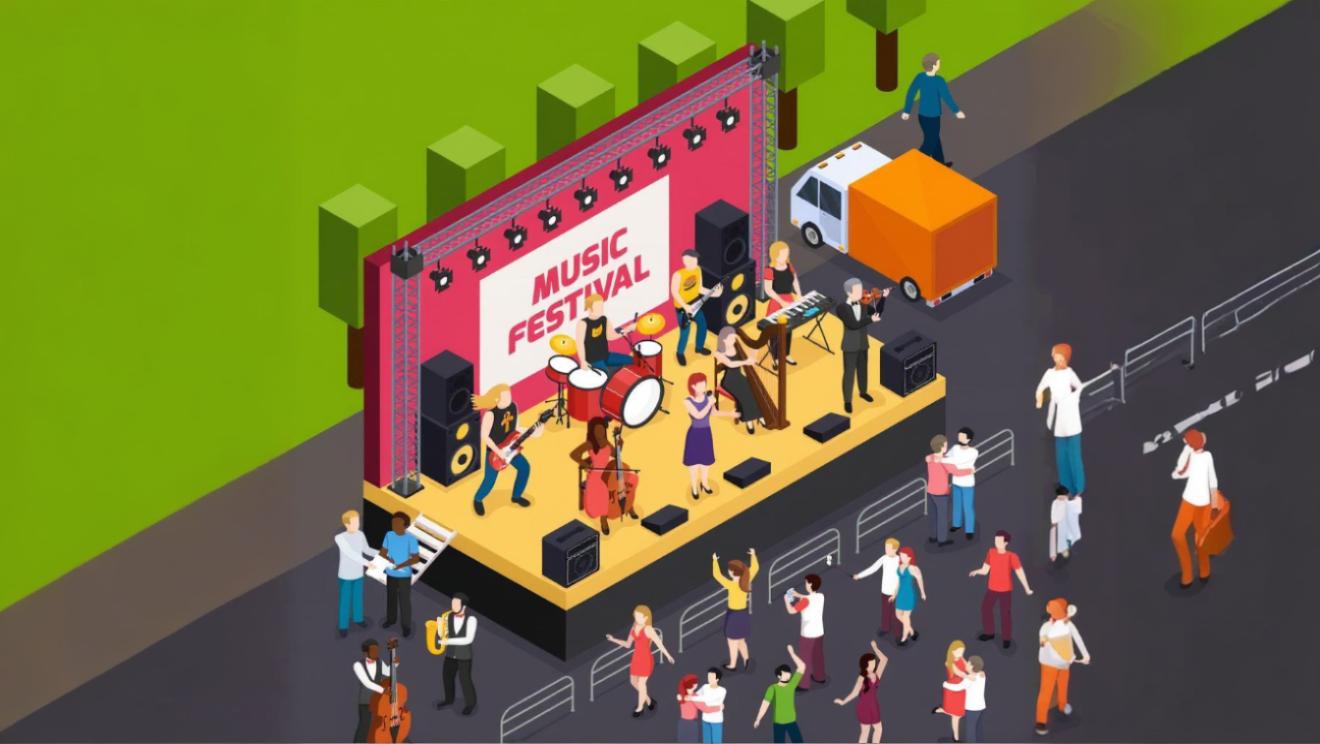
Sustainability and Compliance Tracking
Environmental concerns have become increasingly important, with 69% of respondents expressing positive sentiment towards nature-based events. Modern festival management software should include features for tracking environmental impact, managing sustainability initiatives, and documenting compliance with local regulations.
Future Technology Trends Shaping Festival Management
The festival management software landscape continues evolving with emerging technologies that promise to streamline operations further and enhance the attendee experience.
Technology Integration and Innovation
Technology integration, including RFID wristbands and mobile apps, is enhancing the festival experience and improving operations. Management platforms increasingly integrate with these technologies to provide real-time data about attendance patterns, vendor performance, and operational efficiency.
One of the most prominent trends is the increasing integration of technology into the festival experience. From live streaming performances to utilizing VR and AR for enhanced audience engagement, technology is redefining how fans interact with music festivals.
Data-Driven Decision Making
Advanced analytics capabilities allow promoters to make more informed decisions about everything from artist booking to vendor selection. Modern platforms collect data throughout the festival lifecycle and provide insights that can improve future event planning.
Automation and Efficiency Improvements
Emerging platforms increasingly automate routine tasks like payment processing, contract reminders, and status updates. This automation frees up festival teams to focus on creative and strategic aspects of event production rather than administrative tasks.

Making the Right Software Choice for Your Festival
Selecting the appropriate music festival management software requires careful evaluation of your specific operational needs, team structure, and growth plans. The right platform should feel like a natural extension of your existing workflows rather than a system you need to work around.
Assessing Your Current Operations
Before evaluating software options, conduct an honest assessment of your current pain points and inefficiencies. As noted in our previous analysis of industry challenges, if you’re like many business managers, you are likely using multiple systems to automate at least some of the tasks, but those systems are often outdated and disconnected.
Document the specific areas where your team loses time or encounters coordination problems. This analysis will help you prioritize features when evaluating different platforms.
Implementation and Team Adoption
The best software in the world won’t help if your team doesn’t adopt it effectively. Look for platforms that offer comprehensive training resources and support during the implementation process. The system should enhance your team’s capabilities rather than requiring them to completely change their working methods.
Integration Requirements
Consider how the festival management software will connect with your existing tools and systems. Whether you’re using specific accounting software, ticketing platforms, or marketing tools, seamless integration eliminates duplicate data entry and reduces the risk of errors.
Streamline Your Festival Operations
The music festival industry’s continued growth presents both tremendous opportunities and increasing operational complexity. As noted in the festival trends research mentioned earlier, adapting to these trends is crucial for success in the competitive festival market. The right music festival management software can mean the difference between a chaotic planning process and a smoothly executed event that leaves attendees excited for next year.
Successful festival promoters understand that investing in proper management tools isn’t just about efficiency—it’s about creating the foundation for sustainable growth in an increasingly competitive market. The platforms that understand the unique demands of live music events provide promoters with the operational clarity and coordination capabilities they need to thrive.
Whether you’re planning an intimate boutique festival or a large-scale multi-day event, the right software platform can transform your operational approach and help you create unforgettable experiences for your audience. As the industry continues evolving, promoters who embrace comprehensive management solutions position themselves for long-term success in this dynamic market.
Ready to streamline your festival operations and take control of your event management process? Prism offers comprehensive live music management software designed specifically for the unique needs of festival promoters and venue operators. From initial planning through final settlement, our platform helps you coordinate every aspect of your events while maintaining the financial clarity essential for sustainable growth. Get started with Prism today and discover how the right tools can transform your festival management approach.
Essential Questions for Festival Software Evaluation
What specific features does the platform offer for managing artist contracts and rider requirements?
Look for systems that understand the complexities of artist agreements, including technical requirements, hospitality needs, and settlement procedures. The platform should store all relevant documentation and provide automated reminders for key deadlines.
How does the software handle multi-stakeholder communication and coordination?
Effective festival management requires constant communication between promoters, artists, vendors, and staff. The platform should provide clear communication channels while maintaining appropriate access controls for different stakeholder groups.
What financial tracking and reporting capabilities are included?
Given the complex financial structure of most festivals, robust financial tracking becomes essential. The system should handle multiple revenue streams, complex expense categorization, and provide real-time visibility into financial performance.
How does the platform support mobile access and remote team coordination?
Festival teams work from multiple locations throughout the planning and execution process. The software should provide full functionality from mobile devices and maintain real-time synchronization across all access points.
What integration options are available for connecting with existing tools and systems?
Most festivals use multiple software tools for different aspects of their operations. The management platform should integrate smoothly with existing systems to eliminate duplicate data entry and maintain consistent information across all tools.
Does the platform understand industry-specific workflows and terminology?
The best festival management software is built by teams who understand the live music industry. Look for platforms that handle concepts like holds, offers, settlements, and co-promoter arrangements without requiring extensive customization.

Matt Ford is the founder and CEO of Prism.fm, an Austin-based software company revolutionizing live music event management. With a background in entrepreneurship and a degree from the University of Wisconsin-Madison School of Business, Ford combined his self-taught coding skills with firsthand experience as a concert promoter to address the inefficiencies he observed in the industry. In 2018, he launched Prism.fm, an all-in-one platform designed to streamline operations for venues, promoters, and agencies by replacing cumbersome spreadsheets with integrated tools for booking, financial tracking, and contract management. Under his leadership, Prism.fm has grown significantly, achieving $3 million in annual recurring revenue post-COVID and securing over $15 million in funding . Ford’s commitment to building user-centric solutions has positioned Prism.fm as a trusted partner for over 1,500 venues and promoters worldwide.

